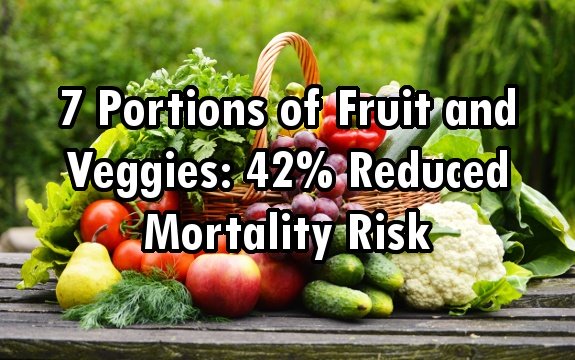7 Portions of Fruit and Veggies Daily Leads to 42% Reduced Mortality Risk

 Everyone knows fruit and vegetables are good for you. You likely even know that they could save your life when they are eaten in place of or in addition to other, not so healthful foods. A new study published in the Journal of Epidemiology and Community Health indicates that the benefits in fresh produce are multiplied exponentially as our consumption increases. In other words, they aren’t only good for you—they are really, really, really good for you.
Everyone knows fruit and vegetables are good for you. You likely even know that they could save your life when they are eaten in place of or in addition to other, not so healthful foods. A new study published in the Journal of Epidemiology and Community Health indicates that the benefits in fresh produce are multiplied exponentially as our consumption increases. In other words, they aren’t only good for you—they are really, really, really good for you.
“We all know that eating fruit and vegetables is healthy, but the size of the effect is staggering,” said lead researcher Dr. Oyinlola Oyebode.
Dr. Oyebode and her team of researchers looked at national health surveys in England taken between 2001 and 2008, including data from more than 65,000 people over the age of 35.
Though the survey participants consumed an average of 4 servings of fruit and vegetables on a daily basis, the team determined that 7 servings a day led to a 42% lowered mortality risk.
In the UK, where the study took place, the Department of Health recommends 5 servings of fruit and vegetables each day. Here in the US, the USDA suggests varying amounts depending on your age and gender. The average adult woman between the ages of 31 and 50 should get 2.5 cups daily. For men in the same age bracket, it’s 3 cups. Regardless, the results of this study indicate far more than these recommended amounts is far better.
Read: The 15 Cleanest Fruit and Vegetables – Little Pesticides
The seven-a-day rate also:
- Showed a 31% reduced risk of death by heart disease and stroke.
- Showed a 25% lower risk of death by cancer.
- Reveals that vegetables have greater effects than fruit—with 2-3 portions of vegetables linked with a 19% lower risk of mortality and 2-3 portions of fruit linked with a 10% lower death risk.
Where the fruit was concerned, canned and frozen fruit didn’t provide the same benefits, actually increasing the risk of death by 17%. Dried and fresh, however, were the best, with fruit juice not showing any benefit at all.
For many of us, eating more fruit and vegetables is not a challenge. For others, it’s work, made difficult by old habits, availability of healthy food, and the ongoing battle against processed food marketing.
“I am not a policy expert,” Dr. Oyebode said, “but we know that health education tends to be followed by people who already take good care of their health. Those who are most vulnerable, most disadvantaged and most at risk are probably not currently eating five-a-day and will not eat more just because the government changes its message to seven-a-day.”
In other words, the solution may not be so simple for everyone – but it’s worth the effort.
